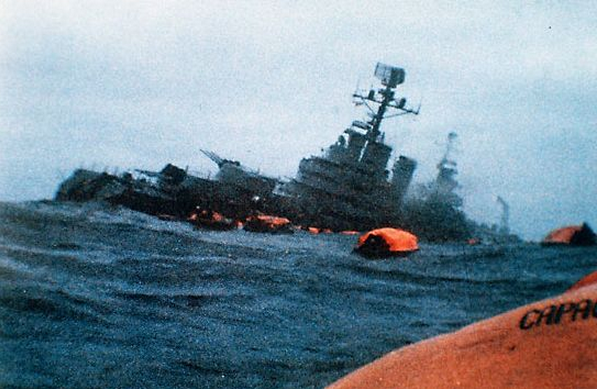May 2
The sinking of the “Admiral Belgrano”
In April 1982, the Argentinian military junta was not doing well, plagued by civil unrest, human rights atrocities, and economic distress. In order to distract the public’s mind from their dictatorial government’s failures, the ruling generals decided to invade the Falkland Islands, a British colony populated almost exclusively by sheep farmers. The islands had been briefly occupied by Argentina in the early nineteenth century and it was a long-standing myth that these Islas Malvinas had been cruelly ripped from their rightful owners by nasty British imperialists. The generals reckoned that the military might of the British lion had grown toothless and that a female leader (Margaret Thatcher) would lack the martial spirit required for a fight; accordingly, Argentinian commandos were landed on the Falklands and other British possessions in the southern Atlantic. Big mistake. Thatcher ordered a military task force to retake the islands, an enormously difficult undertaking carried out over thousands of miles.
Among the ships dispatched south was the nuclear submarine HMS Conqueror carrying ship-killing torpedoes. When it reached the combat area it was particularly on the lookout for the Argentinian aircraft carrier Veinticino de Mayo but what it spotted first was the Admiral Belgrano, an American-built cruiser that had survived the attack on Pearl Harbor and was later sold to Argentina. Conqueror launched three torpedoes at the cruiser, two of which exploded, tearing holes in the ship and causing it to rapidly sink with the loss of 323 crewmen. Even more significant than the destruction of the Belgrano was that its sinking persuaded the Argentinian navy to withdraw to port, leaving the job of attacking the British fleet to land-based aircraft.
The sinking of the Belgrano was immediately controversial, partly because of a tasteless headline in a London tabloid (see below) but also because the ship was outside the maritime exclusion zone and not heading toward the Falklands. Neither of the latter factors mattered militarily and the Argentine navy has always regarded the attack on the cruiser to have been a legitimate act of war.

